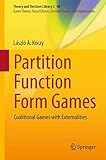Partition function form games: coalition games with externalities
Material type: TextSeries: Theory and decision library C: Game theory, social choice, decision theory, and optimization; Vol. 48Publication details: Springer Nature 2018 ChamDescription: xxi, 312 p.: col. ill. Includes bibliographic references and indexISBN:
TextSeries: Theory and decision library C: Game theory, social choice, decision theory, and optimization; Vol. 48Publication details: Springer Nature 2018 ChamDescription: xxi, 312 p.: col. ill. Includes bibliographic references and indexISBN: - 9783319698403
- 519.3 K6P2
| Item type | Current library | Collection | Call number | Status | Date due | Barcode | Item holds | |
|---|---|---|---|---|---|---|---|---|
 Book
Book
|
Ahmedabad General Stacks | Non-fiction | 519.3 K6P2 (Browse shelf(Opens below)) | Available | 202935 |
Table of Contents:
Part I Foundations;
1. Purpose of the book;
1.1 Introduction;
1.2 About this Book; References;
2. Terminology and Notation;
2.1 Introduction;
2.2 Numbers;
2.3 Sets;
2.3.1 Partitions;
2.3.2 Permutations;
2.4 Vectors and Matrices;
2.5 Graphs and Networks;
2.5.1 Connectivity;
2.5.2 Trees; References;
3. Preliminaries;
3.1 Introduction;
3.2 Normal Form Games;
3.3 Extensive Form Games;
3.4 Characteristic Function Form Games;
3.4.1 Properties;
3.4.2 Solution Concepts: Stability;
3.4.3 Solution Concepts: Fairness;
3.4.4 Games over Networks.
3.5 Partition Function Form Games
3.5.1 Externalities in Partition Function Form Games;
3.5.2 Properties of Partition Function Form Games;
3.5.3 Modified Partition Function Form Games;
3.6 Dynamic Cooperative Games; References;
Part II Stability;
4. Dominance;
4.1 Introduction;
4.2 Direct Dominance Models;
4.3 Coalition Formation Rules;
4.4 Farsightedness; References;
5. The Core;
5.1 Introduction;
5.2 The α-Core;
5.3 The ω-Core;
5.4 Partial Agreement Equilibrium and the s-Core;
5.4.1 Partial Agreement Equilibrium and the γ-Core;
5.4.2 The s-Core;
5.4.3 The Disintegration Rule.
5.4.5 The ϕ-Core
5.5 The merge or m-Core;
5.6 The Projection Rule and the δ-core;
5.7 The Rational Expectations Core;
5.8 Recursive Cores;
5.8.1 The r-Theory;
5.8.2 The Recursive Core;
5.9 An Axiomatic Comparison;
5.9.1 Axioms;
5.9.2 Characterisations;
5.10 Conclusion; References;
6. Implementation of the Core;
6.1 Introduction;
6.2 Simultaneous Announcement Models;
6.3 Alternating Offers Bargaining Model;
6.4 Sequential Coalition Formation with Fixed Payoff Division;
6.4.1 Stationary Equilibrium Coalition Structures;
6.4.2 Symmetric Partition Function Form Games.
6.5 Sequential Coalition Formation in Totally Balanced Games
6.5.1 A Continuous-Time Bargaining Model;
6.5.2 An Order-Independent Equilibrium Coalition Structures;
6.6 Implementation in General Partition Function Form Games;
6.6.1 A Two-Stage Coalition Formation Game;
6.6.2 A Sequential Coalition Formation Model;
6.7 Conclusion;
6.A Appendix;
6.A.1 The Core of the Game in Example
6.21; References;
7. Other stability concepts;
7.1 Introduction;
7.2 The Stable Set;
7.2.1 Introduction;
7.3 Equilibrium Binding Agreements;
7.3.1 Strategic Setting;
7.3.2 Partition Function Setting;
7.3.3 Extensions.
7.4 ConclusionReferences;
Part III Fairness;
8. Axioms;
8.1 Introduction;
8.2 Common Axioms;
8.2.1 Efficiency;
8.2.2 Anonymity;
8.2.3 Symmetry;
8.2.4 Standard Property;
8.3 Carriers and Null Players;
8.3.1 Carrier Axiom;
8.3.2 Oligarchy;
8.3.3 Null Players;
8.3.4 Dummy Players;
8.4 Additivity, Linearity and Transfer;
8.5 Marginality and Monotonicity;
8.6 External Axioms;
8.7 Conclusion; References;
9. The Shapley-value;
9.1 Introduction;
9.2 Classical Additivity-Based Axiomatisations;
9.2.1 Anonymity, Carrier and Additivity;
9.3 Null Player Property Variations;
9.3.1 Null Player Property
This book presents a systematic overview on partition function form games: a game form in cooperative game theory to integrate externalities for various applications. Cooperative game theory has been immensely useful to study a wide range of issues, but the standard approaches ignore the side effects of cooperation. Recently interest shifted to problems where externalities play the main roles such as models of cooperation in market competition or the shared use of public resources. Such problems require richer models that can explicitly evaluate the side-effects of cooperation. In partition function form games the value of cooperation depends on the outsiders' actions. A recent surge of interest driven by applications has made results very fragmented. This book offers an accessible, yet comprehensive and systematic study of properties, solutions and applications of partition function games surveying both theoretical results and their applications. It assembles a survey of existing research and smaller original results as well as original interpretations and comparisons. The book is self-contained and accessible for readers with little or no knowledge of cooperative game theory.
https://link.springer.com/book/10.1007/978-3-319-69841-0
There are no comments on this title.

